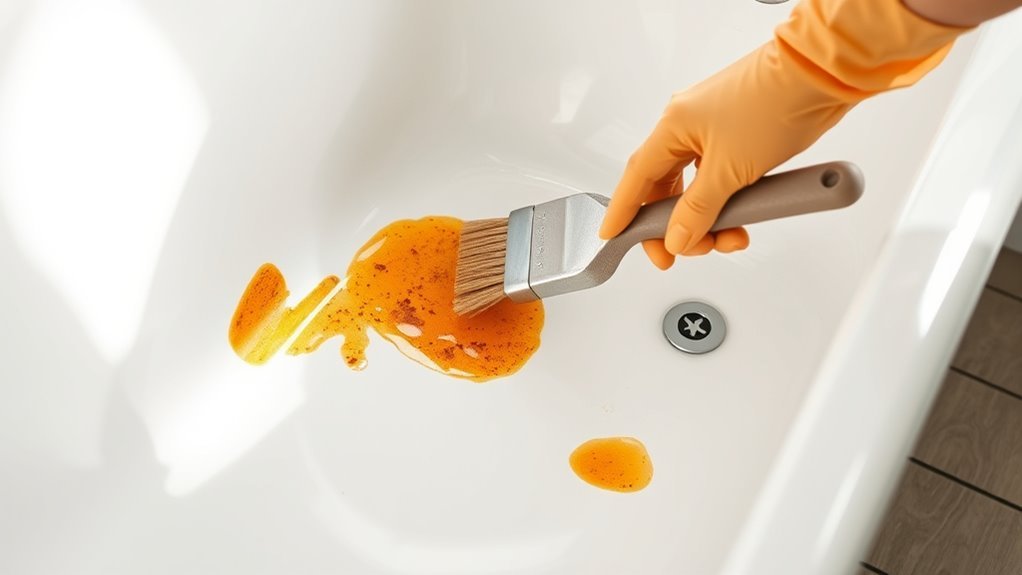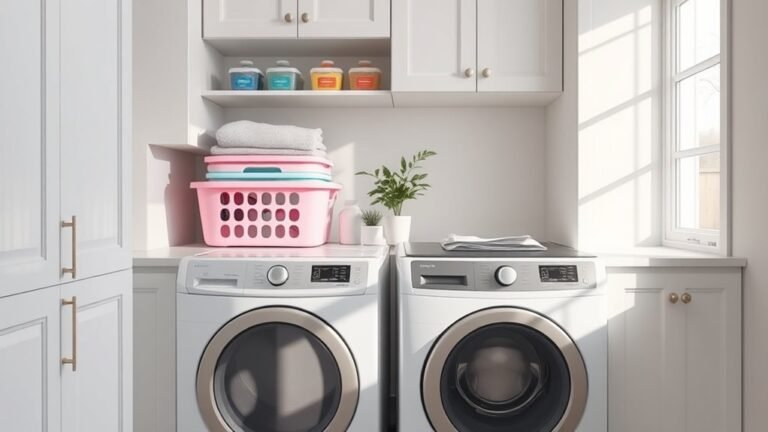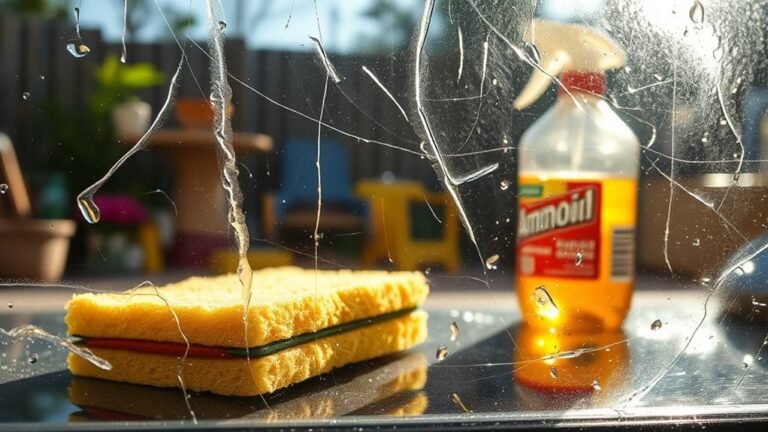Removing Rust Stains From Bathtubs and Sinks
To remove rust stains from your bathtub and sink, start by identifying any corroding metal fixtures or leaks causing the rust. Gather gloves, a scrub brush, and a suitable cleaner—natural options like lemon juice with baking soda work well. Apply the paste, let it sit, scrub, then rinse. For tough stains, commercial rust removers designed for bathrooms are effective but use them carefully. Fix leaks and wipe surfaces dry to prevent rust. Keep exploring for more detailed tips and solutions.
Identifying the Cause of Rust Stains

Why are those stubborn rust stains appearing in your bathtub or sink? To reclaim your space, you need to understand rust sources first. Often, rust stains come from metal fixtures that have started to corrode over time. These fixtures—like faucets, drain covers, or pipes—can release tiny rust particles whenever they come into contact with water. If your water has a high iron content, this accelerates the issue. Another rust source could be old plumbing or even iron-rich water sitting in your pipes. Once you pinpoint what’s causing the rust, you’re better equipped to tackle the stains effectively. Knowing the origin means you’re not just treating symptoms—you’re freeing yourself from recurring rust problems and keeping your bathroom pristine.
Preparing Your Cleaning Supplies
Gathering the right cleaning supplies is essential before you start tackling rust stains on your bathtub or sink. You’ll want to assemble effective cleaning tools like scrub brushes, sponges, and microfiber cloths to work efficiently. Don’t forget to grab a mild abrasive cleaner or rust remover suitable for your surface. Safety gear is a must—wear gloves to protect your hands and consider goggles if you’re using stronger products. Having a well-ventilated space or a fan nearby helps keep fresh air flowing, giving you freedom to clean without discomfort. By preparing your cleaning tools and safety gear thoughtfully, you set yourself up for a smooth, safe experience removing rust stains without hassle or worry.
Using Natural Remedies to Remove Rust

Although commercial rust removers can be effective, you might prefer natural remedies that are safer for your skin and the environment. One simple method is mixing lemon juice with baking soda to create a paste. The acidity in lemon juice breaks down rust, while baking soda gently scrubs without harming your surfaces. Apply the paste directly onto the rust stains and let it sit for 15-20 minutes. Then, use a soft cloth or sponge to scrub the area in circular motions. Rinse thoroughly with water and repeat if necessary. This approach gives you control and peace of mind, letting you clean your bathtub or sink without harsh chemicals. Embracing these natural options keeps your space fresh while respecting your freedom to choose safer cleaning methods.
Applying Commercial Rust Removers Safely
If natural remedies don’t fully remove rust stains from your bathtub or sink, commercial rust removers can offer a stronger solution. When choosing a product, prioritize those designed specifically for bathroom surfaces to avoid damage. Always read the label carefully to guarantee it suits your fixture’s material. Safety precautions are essential: wear gloves and work in a well-ventilated area to protect your skin and lungs from harsh chemicals. Avoid mixing products, as this can create dangerous fumes. Apply the remover with a soft cloth or sponge, following the instructions precisely to prevent overuse or damage. Rinse thoroughly afterward to remove any residue. By selecting the right product and taking proper safety precautions, you can effectively tackle stubborn rust stains without compromising your freedom or safety.
Preventing Future Rust Stains in Your Bathroom

Keeping rust stains from coming back in your bathroom starts with a few simple habits. First, prioritize preventive maintenance by regularly checking faucets, pipes, and fixtures for leaks or signs of rust. Fixing these early prevents iron buildup that leads to stains. Next, enhance bathroom ventilation to reduce moisture, which accelerates rust formation. Use exhaust fans during and after showers or open windows to keep air flowing freely. Avoid leaving metal cans or wet items on surfaces since prolonged contact can cause rust spots. Finally, wipe down your bathtub and sink after use to remove water droplets that may contain iron. By adopting these straightforward steps, you’ll keep your bathroom looking fresh and rust-free, giving you the freedom to enjoy a clean, stain-free space without constant worry.
Frequently Asked Questions
Can Rust Stains Damage the Plumbing Underneath My Sink or Tub?
You might wonder if rust stains can lead to rust damage beneath your sink or tub. While surface stains themselves don’t directly harm plumbing, they can signal underlying corrosion issues. Ignoring these signs can compromise your pipes over time. Staying on top of plumbing maintenance helps you avoid costly repairs and keeps your freedom from unexpected leaks or damage. So, don’t let rust stains slide; they’re worth checking out!
Are There Any Health Risks Associated With Rust Stains in Bathrooms?
You don’t need to worry too much about rust health risks since rust stains themselves aren’t typically harmful. However, they can indicate moisture issues that might promote mold, which is a bigger health concern. For stain prevention, keep your bathroom dry and clean to avoid rust buildup. Staying proactive lets you enjoy your space without restrictions, keeping things fresh and safe while avoiding potential long-term problems linked to untreated rust and moisture.
How Do I Remove Rust Stains From Porcelain Versus Acrylic Surfaces?
Oh, because who doesn’t love wrestling rust stains, right? For porcelain surfaces, you’ll want to grab porcelain cleaners—they’re tough but gentle, keeping your freedom intact from harsh scrubbing. Acrylic? Treat it like royalty with acrylic protectants that shield without damage. You get to choose your battle: porcelain’s resilience or acrylic’s delicate charm, all while keeping your hands clean and your surfaces spotless. Freedom means picking the right tools, after all!
Can Rust Stains Be Removed Using a Dishwasher or Washing Machine?
You might wonder if dishwasher efficiency or washing machine effectiveness can tackle rust stains. Unfortunately, neither appliance is designed for rust removal on surfaces—they clean dishes and clothes, not stubborn rust. Using them won’t free you from rust stains; instead, you’ll want to rely on specialized cleaners or natural remedies. This way, you maintain your freedom from ineffective methods and get the results you really want.
What Should I Do if Rust Stains Reappear Immediately After Cleaning?
If rust stains keep coming back right after you clean, you’ll want to revisit your cleaning techniques and add some preventive measures. Make sure you’re using rust-specific cleaners and not just general products. After cleaning, dry the surface thoroughly to stop moisture buildup, which causes rust. Also, consider applying a protective coating or sealant to block rust formation. Staying consistent with these steps will help you enjoy a rust-free space and more freedom from constant cleaning.






